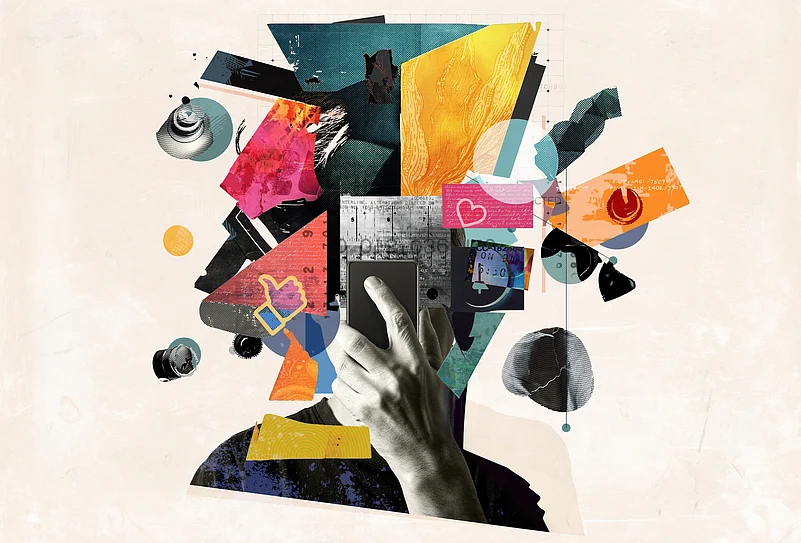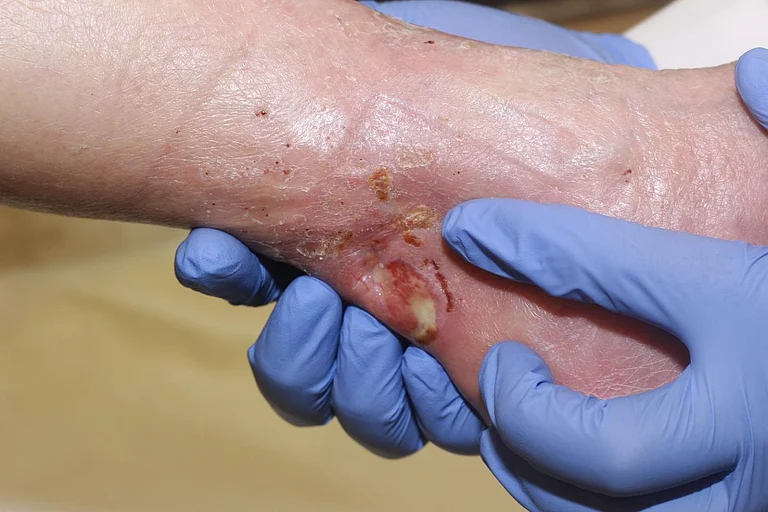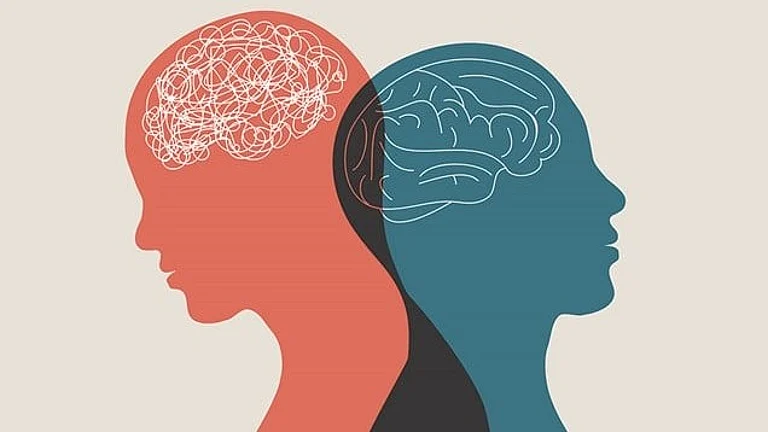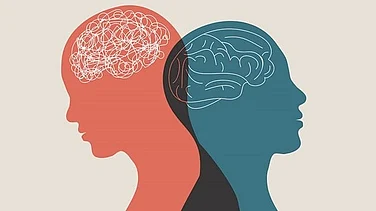
Between 2022 and 2023, India saw a 70 per cent increase in Instagram accounts focused on mental health and wellness.
India has only 0.75 psychiatrists, 0.07 psychologists, and 0.07 social workers per 100,000 people, far below the WHO's recommended minimum of 3 psychiatrists per 100,000.
In 2023, the Karnataka High Court took note of rising complaints around pseudo-therapists and directed the government to regulate social media accounts offering unlicensed mental health advice.
In India today, trauma has become a trending topic. So has healing. Across social media, terms once used by trained professionals such as ‘inner child,’ ‘trauma healing,’ ‘anxious attachment,’ now flow freely in reels, stories, and livestreams. Healing is being promised in 30-second clips. Emotional recovery is repackaged into bite-sized online courses. And the language of therapy has shifted from clinics to scrollable reels.
But behind this digital explosion of wellness lies a deeper tension: what counts as real care, and who gets to offer it? Is this a long-overdue opening up of mental health conversations? Or the commercialisation of distress, one reel, one course, one overconfident influencer?
The Rise of Influencer-Therapists
Atul Kawthalkar is one among the many new names in India’s digital wellness economy. An engineer-turned-actor who now identifies as a “mental wellness facilitator,” he offers programmes that blend spiritual practices, meditation, and Cognitive Behavioural Therapy (CBT) principles. His popular workshop, ‘Freedom from Anxiety and Stress,’ promises you deep and quick healing.
“I can help you heal your anxiety,” Kawthalkar says in his Instagram videos, with the conviction of someone selling certainty.
His qualifications? A diploma in psychology. That's it. And he's not the only one.
Then there’s Akshara Damle, who calls himself a “Celebrity Psychologist”. Obviously, he is a regular psychologist, because there’s no special department for celebrities versus normal ones. He runs a mental wellness website called ‘Manosamvaada’, where he promises to completely transform your mental health with his “Mental Wellbeing Mastery” programme in just nine days.
Between 2022 and 2023, India saw a 70 per cent increase in Instagram accounts focused on mental health and wellness, from approximately 5,062 to over 8,562 and reached 11,894 in 2024, according to the data-driven platform Qoruz. Many of these are run by life coaches, self-styled healers, and influencers with little to no formal training in psychology.
The appeal is easy to understand. In a country where stigma around therapy still exists and cost remains a major barrier, influencers fill a visible gap. But this gap is not just social, it’s structural. According to the World Health Organization’s Mental Health Atlas (2020), India has only 0.75 psychiatrists, 0.07 psychologists, and 0.07 social workers per 100,000 people, far below the WHO's recommended minimum of three psychiatrists per 100,000. In this vacuum, influencers offering emotional language, easy access, and a sense of community can appear like lifelines. But often, what they are selling is a shortcut, and sometimes, a trap.
Help or Harm? The Fragile Trust Around Mental Health
Take the case of Shankar Ganesh, who met a woman named Raveera during the pandemic on a dating app. She identified herself as a “wellness therapist” and directed him to her Instagram page, Positive For A 360 Life. Convinced by her pitch, Ganesh enrolled in online sessions, transferring over ₹3.15 lakh. Within weeks, he was blocked across platforms. He later found she operated more than 15 social media accounts under various names.
In 2023, the Karnataka High Court took note of rising complaints around pseudo-therapists and directed the government to regulate social media accounts offering unlicensed mental health advice. The court acknowledged a growing crisis: the blurring of lines between trained professionals and charismatic influencers.
This is not the only case of people being misled by pseudo-psychologists.
Shraddha Maurya, a trained counselling psychologist, shared the case of Aman (name changed). He was struggling with OCD and found someone online who claimed to be a psychologist. But the person turned out to be a naturopathy and yoga practitioner, not a trained psychologist. He misled Aman, pushed him to quit his good job, and even told him to visit an astrologer because of supposed issues in his ‘Kundali’ (birth chart). He initially promised healing in 3-4 sessions, but kept extending the treatment while charging Rs 5,000 each time.”
Siddique Shaikh, a digital strategist, once interacted with a woman who claimed to be a psychologist. She said she was a homemaker who had become a professional counsellor. Since Siddique often interacts with mental health professionals, he found it odd, especially because she was charging money for each session.
These experiences reflect the deeper confusion of our digital moment. Therapy is more visible than ever, but less clearly defined.
Not All Non-Therapists Are Dangerous
Nuance is essential. Not all mental health support needs to come from clinical psychologists or psychiatrists. In a country like India, where nearly 80 per cent of people with mental illness receive no formal treatment (National Mental Health Survey, 2016), community-based, low-cost alternatives aren’t just helpful, they’re crucial.
Take ‘Atmiyata’, a grassroots initiative in rural Maharashtra. It trains local community members, known as ‘Champions’, to identify signs of distress, offer basic counselling, and refer serious cases to professionals. These are not doctors or therapists, but neighbours, shopkeepers, school teachers, people embedded in the social fabric. They’re trained, supervised, and follow clear protocols. And the results? A 2020 evaluation showed reduced symptoms of depression and anxiety among those supported by Atmiyata workers.
Or consider ‘iCall’, a helpline launched by the Tata Institute of Social Sciences (TISS). Staffed by trained lay counsellors and social workers, it offers free, confidential support over phone, email, and chat, in English, Hindi, and regional languages. Between March and December 2020 alone, iCall responded to over 17,000 calls, many from people struggling with pandemic-related grief, job loss, domestic violence, and suicidal thoughts.
Then there are peer-led support groups, like those facilitated by ‘The Mind Clan’, a curated mental health platform that connects users to inclusive resources. Or ‘Aasra’, a Mumbai-based suicide prevention NGO that’s been running a 24/7 helpline for over two decades, manned by volunteers trained in active listening and crisis response.
The difference? These programmes are built on training, ethics, accountability, and supervision.
“Not everyone who’s not a psychologist is dangerous,” says Dr. Sunaina Goswami, who has a PhD in Psychology and is a practising consultant. “But there’s a world of difference between a trained peer supporter and an Instagram coach selling trauma healing for Rs 15,000 with no follow-up.”
When Everyone's a Therapist, Whom Do You Trust?
One reason this space feels so murky is that India currently has no law clearly regulating who can call themselves a counsellor or therapist. According to Dr. Goswami: “To be a licensed clinical psychologist in India, you need an M.Phil from a Rehabilitation Council of India (RCI)-recognised institution, or a PsyD. Only psychiatrists, who are trained doctors, can prescribe medicine. But right now, someone who has done a two-week online course in coaching or Neuro-Linguistic Programming (NLP) can call themselves a therapist, and no one stops them.”
In the UK, in comparison, terms like “psychotherapist” and “clinical psychologist” are legally protected, but India is slowly moving in that direction and digital platforms have raced ahead.
Healing as a Business and a Burden
The darker side of this trend isn’t just that some people get cheated; it’s what happens afterwards. People who have invested time, trust, and money into these programs often walk away disillusioned. They feel like they have failed. And worse, they start to believe that therapy itself doesn’t work. This erosion of trust is one of the most dangerous outcomes of unregulated digital healing.
As Dr. Goswami warns: “If someone feels betrayed by a fake healer, they may never approach a real one. They start to think that mental health care itself is a scam. That leads to more silent suffering. More untreated pain.”
What This Moment Demands
How do we move forward in a world where therapy comes in so many shapes and sizes? We need stricter regulations, and social media platforms and the government must work together to flag accounts that offer medical or therapeutic advice without proper credentials. Public education is also essential. People should know how to check a therapist’s qualifications, what questions to ask, and how to spot red flags. Ethical, community-based care must be supported too; lay counsellors, peer support groups, and digital platforms can play an important role, but only when grounded in proper training, transparency, and accountability. And above all, we need to stop treating mental health like a trend. Healing is not a hack, a weekend course, or a filter you can apply on a reel; it’s a process that deserves time, care, and seriousness.
Feeling lost in the digital maze of healing is natural. When we are in pain, it’s human to seek quick relief. But emotional wellbeing deserves the same kind of seriousness we give physical health. Not every therapist wears a white coat. But not everyone offering “therapy” online is safe, either.
What we need is a middle path, one that honours lived experience and community wisdom, without sacrificing accountability. Because behind every search for healing is a real person. And that person deserves the truth, not theatre.





























